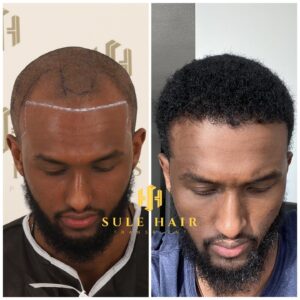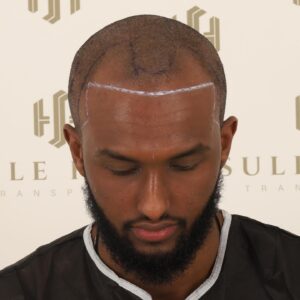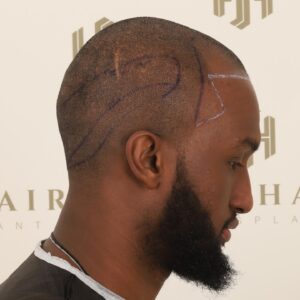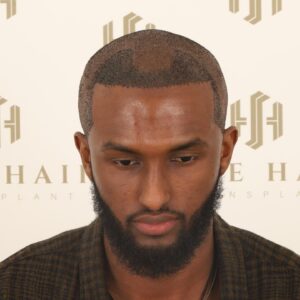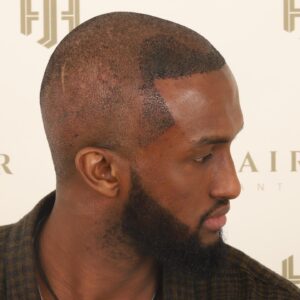Afro-hair transplant is a type of hair transplant surgery that involves transplanting hair follicles from an individual with tightly curled or coiled hair, often of African descent, to an area of the scalp, experiencing hair loss or thinning.
The procedure typically involves:
- Taking hair follicles from the donor area onto the patient’s scalp.
- Usually, the back or sides of the head.
- Transplanting them to the recipient area where hair is thinning or lost.
The transplanted hair is typically resistant to the effects of male pattern baldness, making it a suitable option for individuals with Afro-textured hair who are experiencing hair loss.
Like other types of hair transplant surgeries, an Afro hair transplant can be performed using the FUE (Follicular Unit Extraction) or FUT (Follicular Unit Transplantation) method. It is important to consult with a qualified and experienced hair transplant surgeon to determine if an Afro hair transplant is the right option for your individual needs and goals.
What Type of Afro Hair Do I Have?
There are several types of Afro hair, and determining your specific hair type can help you better understand how to care for and style your hair. The most widely used classification system for Afro hair types was created by stylist Andre Walker, who categorizes hair types from 1A (straight hair) to 4C (oily hair). Here are the different Afro hair types:
- Type 1: Straight hair, which is typically fine and tends to be oily.
- Type 2: Wavy hair, which has a slight wave and can range from fine to coarse.
- Type 3: Curly hair, which has a more defined curl pattern and can range from loose curls to corkscrew curls.
- Type 4: Coily hair, which has a very tight curl pattern and can range from small coils to very tight coils.
Each hair type may have further variations in texture, porosity, and thickness. Knowing your specific hair type can help you choose the right products, styles, and hair care routines that work best for your hair. You can consult with a hairstylist or dermatologist specializing in Afro hair to determine your specific hair type and get personalized recommendations for caring for your hair.
Should I get an afro hair transplant for hair loss?
If you are starting to experience hair loss, getting an Afro hair transplant may not be the first course of action. Hair loss can have many causes, including genetics, age, hormonal changes, medical conditions, and certain medications, and it is important to determine the underlying cause before deciding on a treatment plan. At the Sule Clinic, we use trichology to determine what’s wrong with your hair and scalp. For example, we use it to determine if you have androgenetic alopecia, alopecia areata, telogen effluvium, or scalp psoriasis. It can also be used to see how well hair grows after treatment.
It is recommended to consult with a qualified and experienced hair transplant surgeon or a dermatologist who specializes in hair loss to determine the cause of your hair loss and the best course of treatment. Depending on the cause and extent of your hair loss, non-surgical options such as medication, lifestyle changes, or hair restoration treatments such as PRP (Platelet Rich Plasma) therapy or microneedling may be recommended before considering hair transplant surgery.
Hair transplant surgery is a permanent solution for hair loss. Still, it is not suitable for everyone, and it is important to consider the risks and benefits before undergoing the procedure. Additionally, hair transplant surgery requires sufficient donor hair, which may be limited in some individuals with Afro hair due to the unique characteristics of Afro-textured hair. A qualified hair transplant surgeon can assess your needs and determine if you are suitable for Afro hair transplant surgery.
Best Afro hair transplant method?
Two main methods of hair transplant surgery are commonly used: follicular unit extraction (FUE) and follicular unit transplantation (FUT). Both methods have advantages and disadvantages, and the best method depends on the patient’s needs and goals.
FUE involves extracting hair follicles from the donor area and transplanting them to the recipient area. FUE is a minimally invasive procedure that does not leave a visible linear scar, making it a good option for individuals who prefer to wear their hair short. However, FUE can be more time-consuming than FUT, as each hair follicle must be extracted individually.
FUT involves removing a strip of scalp from the donor area and dissecting it into individual hair follicles for transplantation. FUT can be a faster procedure than FUE and provide more hair follicles for transplantation. However, FUT leaves a linear scar in the donor area, which may be visible if the patient wears short hair.
Ultimately, the best method for Afro hair transplant surgery depends on the patient’s hair texture, hair loss pattern, and hair transplant goals. It is important to consult with a qualified and experienced hair transplant surgeon to determine the best method for your individual needs and goals. The surgeon can evaluate your hair and scalp, discuss your options, and recommend a personalized treatment plan for your Afro hair transplant surgery in Turkey.
FUE involves extracting individual hair follicles from the donor area and transplanting them to the recipient area. FUE is a minimally invasive procedure that does not leave a visible linear scar, making it a good option for individuals who prefer to wear their hair short. However, FUE can be more time-consuming than FUT, as each hair follicle must be extracted individually.
FUT involves removing a strip of scalp from the donor area and dissecting it into individual hair follicles for transplantation. FUT can be a faster procedure than FUE and can provide a larger number of hair follicles for transplantation. However, FUT does leave a linear scar in the donor area, which may be visible if the patient wears their hair short.
Ultimately, the best method for Afro hair transplant surgery will depend on the patient’s individual hair texture, hair loss pattern, and hair transplant goals. It is important to consult with a qualified and experienced hair transplant surgeon to determine the best method for your individual needs and goals. The surgeon can evaluate your hair and scalp, discuss your options, and recommend a personalized treatment plan for your Afro hair transplant surgery in Turkey.
Advantages of Afro Hair Transplant
Hair transplant surgery has several advantages for individuals with tightly curled or coiled hair textures experiencing hair loss or thinning. Some of the advantages of black male hair transplant in Turkey
include:
- Natural-looking results: When performed by a skilled and experienced surgeon, black male hair transplant surgery can produce natural-looking results. The transplanted hair follicles are chosen to match the patient’s hair texture and density, resulting in a seamless and natural-looking hairline.
- Permanent solution: Unlike temporary hair loss solutions such as wigs or hairpieces, Afro hair transplant surgery provides a permanent solution for hair loss. The transplanted hair follicles are resistant to the effects of male pattern baldness, which means they will continue to grow hair for the rest of the patient’s life.
- Increased self-confidence: Hair loss can significantly impact an individual’s self-confidence and self-esteem. Afro hair transplant surgery can help restore a natural-looking hairline, improving an individual’s self-confidence and quality of life.
- Minimal scarring: The FUE (Follicular Unit Extraction) method of black male hair transplant surgery involves extracting individual hair follicles from the donor area without leaving a visible linear scar. “Experience the perfect fit for those who love short hair. Our product is tailored to meet your needs and provides an effortless style that complements your preference for short hair. This makes it a perfect option for those who like to keep their hair short.
- No maintenance required: Once the transplanted hair follicles have healed and started to grow new hair, they require no special maintenance or care. The patient can treat their new hair just like their natural hair.
Overall, afro-hair transplant surgery can provide a safe and effective solution for hair loss in individuals with tightly curled or coiled hair textures. Please contact one of our hair specialists to get a free hair analysis.
Pre-op Instructions
Before undergoing a hair transplant in Turkey, there are several important pre-operative steps that a patient should take to prepare for the procedure:
- Consultation: The first step is to schedule a consultation with a qualified and experienced hair transplant surgeon. During the consultation, the surgeon will evaluate the patient’s hair loss pattern, hair texture, and overall scalp health to determine if they are a good candidate for an Afro hair transplant.
- Medical history and medications: Patients should provide a comprehensive medical history and a list of all medications they take, including over-the-counter and prescription drugs, to the surgeon. Certain medications, such as blood thinners, may need to be temporarily discontinued before the procedure to reduce the risk of excessive bleeding.
- Blood tests: Some surgeons may require blood tests before the surgery to ensure the patient is healthy enough to undergo the procedure. Before hair transplantation, blood analysis is performed at the Sule Clinic.
- Pre-operative instructions: Patients will receive specific pre-operative instructions from their surgeon, including avoiding certain foods, supplements, and medications and stopping smoking several weeks before the procedure.
- Shampooing: Patients may be instructed to shampoo their hair the day before the procedure to ensure that the scalp is clean and free of any oils or products that may interfere with the transplantation process.
By following these pre-operative steps, patients can help ensure a successful and safe Afro hair transplant procedure.
The Best Afro Hair Transplant in Turkey
Innovative Hair Transplant in Turkey of the Year Award: SULE HAIR Clinic
Post-op Instructions
After undergoing afro-hair transplant surgery, proper aftercare is crucial for optimal healing and hair growth. Here are some tips for afro-hair transplant aftercare:
- For the first few days after the procedure, avoid touching or scratching the transplanted area. This can disturb the healing process and damage the newly transplanted hair follicles.
- To reduce swelling and discomfort, you should sleep with your head elevated on pillows (included in our package) for the first few nights after the surgery.
- Follow the post-operative instructions provided by your surgeon, which may include washing your hair with a gentle shampoo and avoiding strenuous activity for a certain period.
- Avoid exposing the transplanted area to direct sunlight or extreme temperatures for several weeks following the procedure. This can cause damage to the newly transplanted hair follicles and slow the healing process.
- Take any medications prescribed by your surgeon, such as painkillers or antibiotics, as directed.
- Eat a healthy and balanced diet, rich in vitamins and minerals, to support the healing process and promote hair growth.
- Avoid smoking and alcohol consumption for at least two weeks following the procedure, as these can interfere with the healing process.
- Avoid wearing hats or tight-fitting headgear for at least a week following the procedure, as this can pressure the newly transplanted hair follicles.
- Schedule follow-up appointments with your surgeon to monitor the healing process and assess hair growth after ten days.
By following these aftercare tips, patients can help ensure a successful and safe Afro hair transplant procedure and promote optimal hair growth.
Can I Get an DHI for Afro Hair?
Yes, Direct Hair Implantation (DHI) is another hair transplant method that can be used for Afro hair. DHI is a variation of the FUE (Follicular Unit Extraction) method, in which the extracted hair follicles are implanted directly into the recipient area using a specialized tool known as a Choi Implanter. Visit this post to find out more about the difference between the DHI and FUE methods.
DHI is a minimally invasive procedure that does not require the creation of incisions or channels in the recipient area, which can minimize trauma to the hair follicles and result in faster healing times. Additionally, DHI allows for more precise placement of hair follicles, which can result in a more natural-looking hairline and overall result.
However, as with any hair transplant procedure, the suitability of DHI for Afro hair will depend on individual factors such as hair texture, hair loss pattern, and the quality and quantity of donor hair. It is important to consult with a qualified and experienced hair transplant surgeon to determine the best hair transplant method and treatment plan for your individual needs and goals.
Cost of Afro Hair Transplant in Turkey?
The cost of an Afro hair transplant in Turkey can vary depending on factors such as the extent of hair loss, the number of hair grafts required, the hair transplant technique used, and the reputation and experience of the hair transplant clinic or surgeon. However, the cost of a black male hair transplant in Turkey is typically lower than in many other countries while maintaining high quality and expertise.
On average, an Afro hair transplant in Turkey can cost between $2,000 and USD 4,000. However, the cost may vary depending on the individual case, and some clinics may offer additional services or packages that can affect the overall cost.
When considering an afro-hair transplant in Turkey, it is important to thoroughly research the hair transplant clinics and surgeons to ensure they are reputable and experienced in the field. Additionally, it is important to consider not only the cost but also the quality and safety of the procedure and any additional expenses such as travel, accommodation, and post-operative care.
FAQs: Afro Hair Transplant in Turkey.
Here are some frequently asked questions (FAQs) about afro-hair transplants in Turkey:
Q: What is afro-hair transplant surgery?
Afro-hair transplant surgery is a procedure in which hair follicles are harvested from a donor area of the scalp and transplanted to the recipient area, usually the front hairline or crown, in individuals with Afro-textured hair.
Q: Why is Turkey a popular destination for afro-hair transplant surgery?
Turkey has become a popular destination for hair transplant surgery due to its experienced and skilled hair transplant surgeons, modern facilities, affordable prices, and easy accessibility from Europe and other parts of the world.
Q: How much does afro-hair transplant surgery cost in Turkey?
| Treatment | Turkey | |
|---|---|---|
| Afro hair transplant | $2250 | $3500 |
Q: How long does the afro-hair transplant surgery take?
The duration of Afro hair transplant surgery can vary depending on the extent of the procedure, the number of hair follicles being transplanted, and the method of hair transplant used. In general, afro-hair transplant surgery can take 4 to 8 hours.
Q: How long does it take to see results after afro-hair transplant surgery?
The transplanted hair follicles can take several months to start growing new hair. Most patients can expect to see visible results within 6 to 12 months after the procedure.
